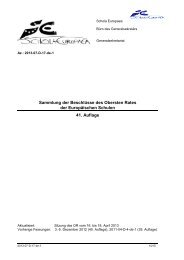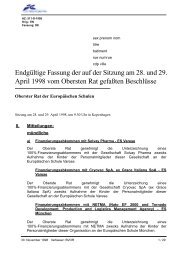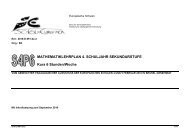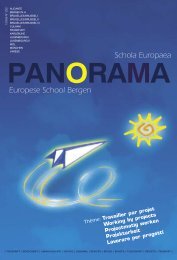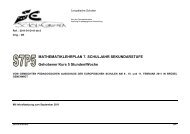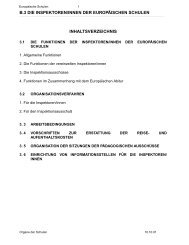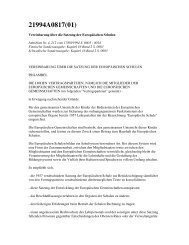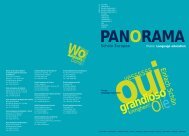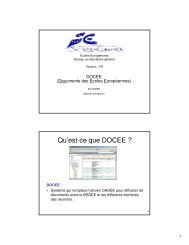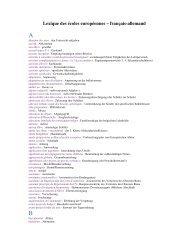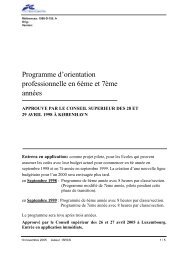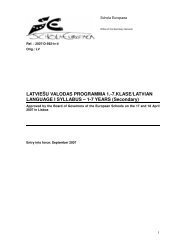External Evaluation of the European Baccalaureate (Annexes)
External Evaluation of the European Baccalaureate (Annexes)
External Evaluation of the European Baccalaureate (Annexes)
You also want an ePaper? Increase the reach of your titles
YUMPU automatically turns print PDFs into web optimized ePapers that Google loves.
Coursework<br />
assessment<br />
Oral<br />
examination<br />
Synoptic<br />
assessment<br />
General Comments<br />
Syllabus<br />
None though 40 marks out <strong>of</strong><br />
subject total for class marks and<br />
class examinations<br />
Two examinations, twenty minutes<br />
each, content not specified in<br />
specification but candidates given<br />
unseen question with 20 minutes<br />
preparation time.<br />
Syllabus claims that Year 7<br />
examinations will also test<br />
‘knowledge gained in previous<br />
years.’ The papers <strong>the</strong>mselves do<br />
not ‘police’ this requirement<br />
155<br />
Section B - Comparative Study <strong>of</strong><br />
three texts<br />
Section C – Poetry : (i) Unseen<br />
Poem; (ii) A general question on one<br />
<strong>of</strong> <strong>the</strong> prescribed poets<br />
None<br />
None<br />
The syllabus for <strong>European</strong> Schools outlines <strong>the</strong> aims, methods and assessment for years 1-7.<br />
Years 5-7 which prepare students for oral and written <strong>Baccalaureate</strong> examinations are given<br />
3 pages in this syllabus under <strong>the</strong> headings <strong>of</strong> Oral Work, Reading, Writing, and Knowledge<br />
about Language.<br />
The approach is different and more comprehensive in <strong>the</strong> Irish school system. A detailed<br />
syllabus outlines <strong>the</strong> aims, objectives, learning outcomes, assessment for <strong>the</strong> Junior cycle <strong>of</strong><br />
years 1-3. It outlines <strong>the</strong> intended focus <strong>of</strong> attention in <strong>the</strong> three interrelated elements that<br />
constitute <strong>the</strong> course: personal literacy, social literacy and cultural literacy. The<br />
interdependence <strong>of</strong> <strong>the</strong>se elements is <strong>the</strong> essential foundation for <strong>the</strong> teaching <strong>of</strong> English in<br />
<strong>the</strong> Junior cycle.<br />
A second syllabus <strong>the</strong>n builds on <strong>the</strong> aims <strong>of</strong> <strong>the</strong> Junior syllabus and outlines a more<br />
sophisticated range <strong>of</strong> skills and concepts. This is a 20 page comprehensive document<br />
providing opportunities for <strong>the</strong> development <strong>of</strong> <strong>the</strong> higher-order thinking skills <strong>of</strong> analysis,<br />
inference, syn<strong>the</strong>sis and evaluation. Itemised lists <strong>of</strong> skills related to specific categories <strong>of</strong><br />
language use are presented as <strong>the</strong> expected learning outcomes. Developing students’<br />
interest in literature is also central to Leaving Certificate English. A range <strong>of</strong> resources from<br />
different periods and cultures is included and students are encouraged to approach <strong>the</strong>m in a<br />
comparative manner.<br />
The course for <strong>the</strong>se two years is organised around two general domains: comprehending<br />
and composing. The concept <strong>of</strong> shaping is central to <strong>the</strong>se two domains. In <strong>the</strong>ir<br />
comprehending tasks students learn how language shapes experience through style, genre<br />
and context. In <strong>the</strong>ir composing tasks students are afforded <strong>the</strong> opportunity <strong>of</strong> using language<br />
to shape experience for <strong>the</strong>mselves. The principle <strong>of</strong> integrating <strong>the</strong> teaching <strong>of</strong> language and<br />
literature, already central to <strong>the</strong> Junior syllabus, is <strong>of</strong> great moment here as well.<br />
To give a more structured sense <strong>of</strong> development to <strong>the</strong> course, <strong>the</strong>se two domains are<br />
encountered in <strong>the</strong> context <strong>of</strong> specific areas <strong>of</strong> language use and through <strong>the</strong> study <strong>of</strong> certain



